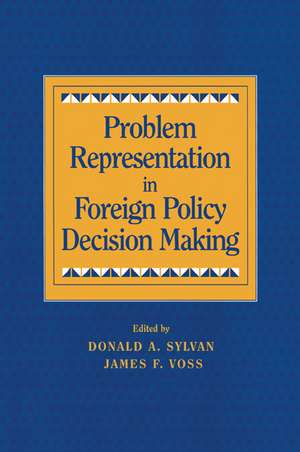Problem Representation in Foreign Policy Decision-Making
Editat de Donald A. Sylvan, James F. Vossen Limba Engleză Paperback – 2 feb 2011
| Toate formatele și edițiile | Preț | Express |
|---|---|---|
| Paperback (1) | 284.64 lei 43-57 zile | |
| Cambridge University Press – 2 feb 2011 | 284.64 lei 43-57 zile | |
| Hardback (1) | 653.86 lei 43-57 zile | |
| Cambridge University Press – 12 sep 1998 | 653.86 lei 43-57 zile |
Preț: 284.64 lei
Nou
Puncte Express: 427
Preț estimativ în valută:
54.48€ • 59.20$ • 45.80£
54.48€ • 59.20$ • 45.80£
Carte tipărită la comandă
Livrare economică 21 aprilie-05 mai
Preluare comenzi: 021 569.72.76
Specificații
ISBN-13: 9780521169578
ISBN-10: 0521169577
Pagini: 358
Dimensiuni: 152 x 229 x 20 mm
Greutate: 0.53 kg
Editura: Cambridge University Press
Colecția Cambridge University Press
Locul publicării:New York, United States
ISBN-10: 0521169577
Pagini: 358
Dimensiuni: 152 x 229 x 20 mm
Greutate: 0.53 kg
Editura: Cambridge University Press
Colecția Cambridge University Press
Locul publicării:New York, United States
Cuprins
Part I. Introducing Problem Presentation: 1. Introduction Donald A. Sylvan; 2. On the representation of problems: an informative processing approach to foreign policy decision making James F. Voss; Part II. Overarching Conceptual Issues: 3. The interpretation of foreign policy events: a cognitive process theory Charles S. Taber; 4. Problem identification in sequential policy decision making: the re-representation of problems Robert Billings and Charles F. Hermann; 5. Collective interpretations: how problem representations aggregate in foreign policy groups Ryan Beasley; 6. Image change and problem representation after the Cold War Martha Cottam and Dorcas E. McCoy: Part III. Empirical Analysis: 7. Problem representations and political expertise: evidence from 'think aloud' protocols of South African elite Helen Purkitt; 8. Reasoning and problem representation in foreign policy: groups, individuals, and stories Donald A. Sylvan and Deborah M. Haddad; 9. Representing problem representation Michael Young; 10. A problem solving perspective on decision-making processes and political strategies in committees Katherine Gannon; 11. When gender goes to combat: the impact of representations in collective decision-making Silvana Rubino-Hallman; 12. Representation of the Gulf Crisis as derived from the US Senate debate James F. Voss, Jennifer Wiley, Joel Kennet, Tonya Schooler and Laurie Ney Silfies; 13. Configuring issue areas: Belgian and Dutch representations of the role in foreign assistance in foreign policy Marijke Breuning; Part IV. Conclusion: 14. Reflecting on the study of problem representation: how are we studying it and what are we learning? Donald A. Sylvan.
Recenzii
"This volume is an excellent addition to the more advanced study of foreign policy analysis. Recommended for upper-division undergraduates and above." Choice
Descriere
This volume explains the representation of a problem as well as the choice among specified options for its solution.
















